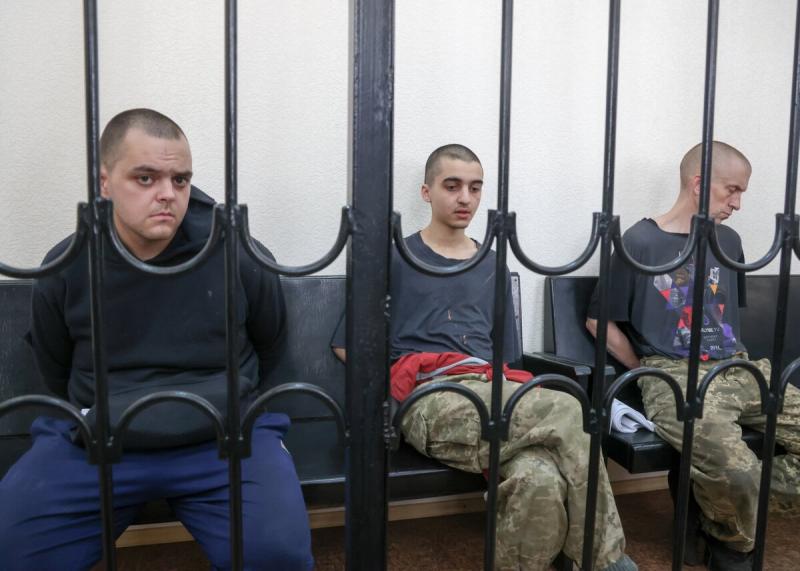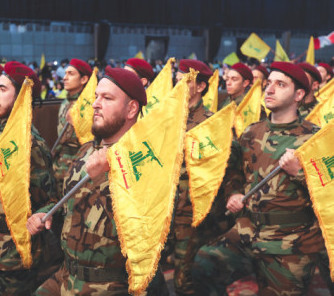
© Vladimir Gerdo/TASS
Last Thursday, June 9, saw the DPR Supreme Court dole out the death penalty to British citizens Aiden Aslin, 28, and Sean Pinner, 48, as well as Moroccan Brahim Saadoun, 21. In the DPR, the death penalty is carried out by firing squad. The defendants were found guilty of "mercenary activities" (Article 440 of the DPR Criminal Code), " forcible seizure of power" (Article 323), "committing a crime as part of a criminal group" (Part 2 of Article 34), "training in order to carry out terrorist activities" (Article 232). Aslin, Pinner and Brahim pleaded guilty to actions aimed at forcibly seizing power. Aslin also admitted the promotion of training in terrorist activities.
The free-of-charge (mind you) defense team said they would appeal against the sentence within one month, as stipulated by the law. Besides, the DPR entitles those convicted to file a clemency application to be considered by republic head Denis Pushilin. By pardon, the death penalty may be commuted to life imprisonment or a prison term of 25 years.
An inquiry into the headline-making case of the three foreign mercenaries was finalized in late May. They were part of the 36th separate brigade of the Ukrainian Marines and were captured in Mariupol in mid-April along with other soldiers of the unit. On June 6, the DPR’s Supreme Court entered into examining the case of two Britons and a Moroccan who were party to combat missions on the side of Ukraine. And on June 9, the court read out a death sentence to all the three “fortunes of war”.
DPR head Pushilin touched upon the issue when appearing on Russia 24 TV channel the day before: "This isn’t part of a military tribunal but a trial against foreign mercenaries ˗ in this case they are Britons ˗ who committed fairly serious crimes. The charges were read at the first hearing already. According to the articles they were charged with, I would not rule out capital punishment." Indeed, Donetsk is preparing for a tribunal, though to convict fighters of the Azov battalion (banned in Russia as a terrorist organization), who surrendered in late May after the siege of Azovstal. Moreover, as stated by the DPR’s Ministry of Foreign Affairs, it’s about an international tribunal engaging representatives beyond the Donbass republics.
Since the capture of Brahim Saadoun, a citizen of the Kingdom of Morocco, that country’s authorities have remained silent and have not spoken out on the issue at all. And official London was quick to react to the Donetsk trial. Back on May 7, British Justice Secretary Dominic Raab said the government will file all the necessary complaints to the relevant bodies if the Britons are sentenced to death. According to him, it is up to the British Foreign office to deal with the case. The only thing that remains unclear is which particular bodies do the British diplomats refer to given that official London does not recognize the DPR?
Russian President’s Press Secretary Dmitry Peskov said the British authorities did not seek to discuss the fate of captured British mercenaries with Russia. If the UK intends to appeal the sentence, this may virtually indicate the recognition of DPR’s sovereignty, the legitimacy of its investigation and trial.
Right after the death penalty was announced, British Foreign Minister Liz Truss, who is Russia’s "great friend and geography expert" condemned the sentence and called it illegitimate. "I utterly condemn the sentencing of Aiden Aslin and Shaun Pinner held by Russian proxies in eastern Ukraine. They are prisoners of war. This is a sham judgment with absolutely no legitimacy… We continue to do everything we can to support them," Truss wrote on Twitter.
In turn, all the mainstream British media rallied to the mercenaries’ defense.
Thus, Reuters slammed the sentence as a "sham judgment" and quoted Boris Johnson's spokesman as saying that the government is "deeply concerned" about the situation and that "under the Geneva Conventions, prisoners of war were entitled to combatant immunity and they should not be prosecuted for participation in hostilities.".
Good for London to have recalled the Geneva Conventions. Now it’s our turn to remind how the Kiev leadership informed the British Foreign Office of its unwillingness to comply with the Geneva Conventions when treating Russia’s prisoners of war. This came in an April statement issued by the Russian Foreign Intelligence Service’s public relations department. The document was naturally ignored, along with execution and torture of captured Russian soldiers.
The Guardian writes that "two British men captured while fighting in the Ukrainian army in Mariupol have been sentenced to death by pro-Russia officials." The outlet cites observers who believe that charges against Aslin and Pinner are "fake", calling the trial itself a show aimed to imitate that of Russian soldiers in Kiev. The newspaper notes there is still a moratorium on the death penalty in Russia, but it does not apply to Moscow-controlled Donbass territories. Well, maybe this circumstance will discourage thrill-seekers and fast-buck artists from playing war games with Russia. After all, there are some 7 000 of them who came to Ukraine, as assessed by the Russian Defense Ministry.
"Russian state media has persistently accused the West of sending mercenaries to fight in Ukraine," The Telegraph writes, "so a high-profile trial of foreign fighters may prove to be a valuable propaganda tool." The author also notes that Russian lawmakers have recently considered a bill to prohibit the release of Nazis as part of prisoner swaps with Ukraine.
The Times newspaper spells it out quite explicitly: "Kremlin-backed separatists to execute Britons captured in Ukraine." The publication says “Aiden Aslin and Shaun Pinner, as well as Brahim Saadoun, a Moroccan, captured by Russian forces while fighting in Ukraine have been sentenced to death by a court in a Kremlin-backed separatist region.” Referring to Russian "state" media, The Times points out that the Britons "were found guilty of being mercenaries whose actions had resulted in the deaths of civilians."
Stop here and recall an early statement by Russian Defense Ministry Spokesman General Igor Konashenkov, who said that “in accordance with international humanitarian law, mercenaries are not combatants and the best that awaits them is criminal liability.” For this reason, Aslin, Pinner and Saadoun were tried as mercenaries who killed other people, both civilians and soldiers, for money. Death penalty is a well-deserved punishment for them. And don't even think of sympathy or compassion to these “fortunes of war” after all the things they’ve done…









